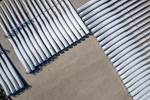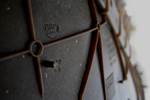BioStruct project to validate biocomposite-focused manufacturing processes
For the next 3 years, Ideko and European partners are working to develop and validate to TLR 7 novel processes to boost the use of natural fibers and biological resins.
Spanish research center Ideko (Elgoibar) announces that it is participating in BioStruct, a 3-year European project that strives to solve the technical problems associated with the use of bio-based composites in industrial structures for sectors such as wind energy or maritime. Due to their less regular and solid properties, biocomposites — while providing sustainable alternatives to replacing synthetic reinforcements like carbon and glass fiber — can still be challenging to implement.
The initiative’s main objective, by December 2026, is to develop and validate new manufacturing processes to boost the use of biocomposites. Objectives include:
- Developing an accurate draping process to control fiber orientation
- Creating material models to capture natural variability
- Integrate nanostructured, bio-based sensors for load monitoring.
Ideko is contributing its know-how in 3D measurement technologies and vision techniques to support and synchronize with the draping manufacturing process and improve its precision.
“Natural composites exhibit greater variability in terms of dimension, weight and appearance,” explains Ibai Leizea, expert in vision technologies at Ideko’s precision engineering research group. “Therefore, precision is crucial when handling fabrics made from natural fibers, especially during the cutting and draping of composite parts. This project will provide a deeper understanding of the mechanical properties of bio-based materials to accurately design structural components and enable their use in such applications.”
The solution proposed by the project will be validated through two use cases: The manufacturing of a hull for a 6-meter electric boat and the production of rotor blades for wind turbines. In both cases, natural fibers and bio-based resins will be used as construction materials. These demonstrations aim to establish technical feasibility and attain a technology readiness level (TRL) of 7.
According to partners, the benefits behind BioStruct will go beyond environmental sustainability. By enhancing the use of biocomposites in structural components, the initiative also aims to reduce carbon and glass fiber dependency, a large proportion of which are produced outside Europe.
“Approximately 80% of all carbon fibers are produced outside of Europe, with about half of the remaining 20% manufactured under foreign licenses, which presents genuine challenges for the strategic autonomy of the European industry,” says an Ideko spokesperson.
The initiative, funded by the EU’s Horizon 2020 program, envisions a market potential for biocomposites of around €100 million by 2030, which could lead to an estimated reduction of 2.5-4.3 million tons of CO2 per year.
BioStruct involves a European consortium led by applied research company Profactor (Austria) and includes Abele Ingenieure (Germany), Amura (Spain), Bladeworks (Italy), Cidetec (Spain), Enginsoft (Italy), Ideko (Spain), Lumoscribe (Cyprus), Noma Resins (Poland) and Techtera (France).
Related Content
-
Optimizing machining for composites: Tool designs, processes and Industry 4.0 systems
Hufschmied moves beyond optimized milling and drilling tools to develop SonicShark inline quality control system and Cutting Edge World cloud platform for optimized tool use and processes.
-
JEC World 2024 highlights: Glass fiber recycling, biocomposites and more
CW technical editor Hannah Mason discusses trends seen at this year’s JEC World trade show, including sustainability-focused technologies and commitments, the Paris Olympics amongst other topics.
-
Bcomp ampliTex makes appearance in Cupra EV Cup Bucket seats
The entire Cupra Born VZ line-up features all-natural fiber front seats that highlight functionality, aesthetics and reduced CO2 emissions.
















